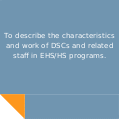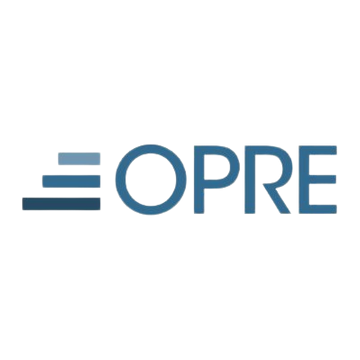Attachment F: Study Awareness
Attachment F Examples of Study Awareness Documentation The Study of Disability Services Coordinators 9-22 clean.docx
The Study of Disability Services Coordinators and Inclusion in Head Start, 2019-2024
Attachment F: Study Awareness
OMB: 0970-0585
Attachment F Examples of Study Awareness Activities
Study of Disability Services Coordinators and Inclusion in Head Start
Attachment F Examples Study Awareness Activities
Table 1 List of Examples of Study Awareness Activities
-
Flyers- Overview of Study
Blurb for Newsletters
Draft Social Media Plan
The items in this attachment provide examples for study awareness documentation that will be shared through OPRE, OHS, and other project partners’ media channels. Each of these examples is expected to be edited and adapted for the audience and updated with current status of the project. The goals for these activities is to increase awareness of the study and interest in the results.
 Study
of Disability Services
Study
of Disability Services
Coordinators and Inclusion in Head Start
Overview: This study will provide a national picture of the Disability Services Coordinators (DSC) workforce for Early Head Start (EHS) and Head Start (HS), including American Indian/Alaska Native (Region XI) and Migrant and Seasonal Head Start (MSHS) (Region XII) grantees. It will also explore DSC practices and policies for working with staff, families, children, and the community. This effort will explore how EHS/HS serves children with disabilities and their families and will seek to understand how EHS/HS collaborates with services in the community, including health providers, Local Education Agencies (LEAs), and early intervention services.
Study Goals:
To identify how children with disabilities and their families are served by EHS/HS, including through recruitment and selection; throughout screening and ongoing assessment; evaluation; and the Individualized Family Service Plan (IFSP), and Individualized Education Plan (IEP) process and implementation.
To identify how EHS/HS programs engage in capacity building with families and provide supportive services to families as they understand and advocate for their children with potential or identified disabilities, delays, or other issues, such as early childhood mental health concerns or chronic health impairments.
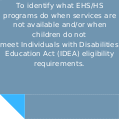
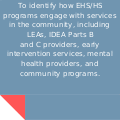
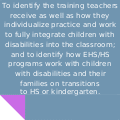
Any Questions?

 The
project team is led by NORC at the University of Chicago, in
partnership with SRI International and consultant Amanda Schwartz.
The PI is Michael López (Lopez- [email protected])
and
the
PD
is
Shannon
TenBroeck
([email protected]).
The Office of Planning,
Research, and Evaluation (OPRE) points of contact is Laura Hoard
([email protected]),
Krystal
Bichay-Awadalla
([email protected]),
Allie
Walker
([email protected]), and Wendy DeCourcey
([email protected]).
The
project team is led by NORC at the University of Chicago, in
partnership with SRI International and consultant Amanda Schwartz.
The PI is Michael López (Lopez- [email protected])
and
the
PD
is
Shannon
TenBroeck
([email protected]).
The Office of Planning,
Research, and Evaluation (OPRE) points of contact is Laura Hoard
([email protected]),
Krystal
Bichay-Awadalla
([email protected]),
Allie
Walker
([email protected]), and Wendy DeCourcey
([email protected]).

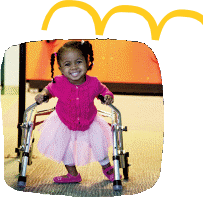

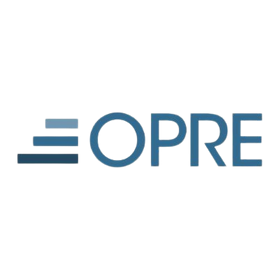 Study
of
Disability
Services
Coordinators
and Inclusion
in
Head
Start
Study
of
Disability
Services
Coordinators
and Inclusion
in
Head
Start
Overview:
This
study will provide a national picture of the Disability Services
Coordinators (DSC) workforce for Early Head Start (EHS) and Head
Start (HS), including American Indian/Alaska Native (Region XI) and
Migrant and Seasonal Head Start (MSHS) (Region XII) grantees. It
will also explore DSC practices
and
policies
for
working
with
staff,
families,
children, and the community. This effort will explore how EHS/HS
serves children with disabilities and
their
families and will seek to understand how EHS/HS collaborates with
services in the community, including health providers, Local
Education Agencies (LEAs), and early intervention
services.
STUDY GOALS:
#1 To describe the characteristics and work of DSCs and related staff in EHS/HS programs.
To identify how children with disabilities and their families are served by EHS/HS, including
#2
#3
#4
#5
#6
ANY QUESTIONS?
The project team is led by NORC at the University of Chicago, in partnership with SRI International and consultant Amanda
Schwartz. The PI is Michael López ([email protected]) and the PD is Shannon TenBroeck ([email protected]). The Office of Planning, Research, and Evaluation (OPRE) points of contact is Laura Hoard ([email protected]), Krystal Bichay-Awadalla ([email protected]), Allie Walker ([email protected]), and Wendy DeCourcey ([email protected]).
Study of Disability Services Coordinators and Inclusion in Head Start
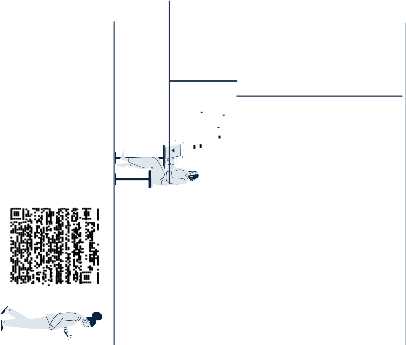 Overview
Overview
This study will provide a national picture of the Disability Services Coordinators (DSC) workforce for Early Head Start (EHS) and Head Start (HS), including American Indian/Alaska Native (Region XI) and Migrant and Seasonal Head Start (MSHS) (Region XII) grantees. It will also explore DSC practices and policies for working with staff, families, children, and the community. This effort will explore how EHS/HS serves children with disabilities and their families and will seek to understand how EHS/HS collaborates with services in the community, including health providers, Local Education Agencies (LEAs), and early intervention services.
Questions?
The project team is led by NORC at the University of Chicago, in partnership with SRI International and consultant Amanda Schwartz. The PI is Michael López ([email protected]) and the PD is Shannon TenBroeck ([email protected]). The Office of Planning, Research, and Evaluation (OPRE) points of contact is Laura Hoard ([email protected]), Krystal Bichay-Awadalla ([email protected]), Allie Walker ([email protected]), and Wendy DeCourcey ([email protected]).
Study goals
To describe the characteristics and work of DSCs and related staff in EHS/HS programs.
To identify how children with disabilities and their families are served by EHS/HS, including through recruitment and selection; throughout screening and ongoing assessment; evaluation; and the Individualized Family Service Plan (IFSP), and Individualized Education Plan (IEP) process and implementation.
To identify how EHS/HS programs engage in capacity building with families and provide supportive services to families as they understand and advocate for their children with potential or identified disabilities, delays, or other issues, such as early childhood mental health concerns or chronic health impairments.
To identify what EHS/HS programs do when services are not available and/or when children do not meet Individuals with Disabilities Education Act (IDEA) eligibility requirements.
To identify how EHS/HS programs engage with services in the community, including LEAs, IDEA Parts B and C providers, early intervention services, mental health providers, and community programs.
To identify the training teachers receive as well as how they individualize practice and work to fully integrate children with disabilities into the classroom; and to identify how EHS/HS programs work with children with disabilities and their families on transitions to HS or kindergarten.
Study of Disability Services
Coordinators and Inclusion in Head Start

OVERVIEW
This
study will provide a
national
picture
of
the
Disability
Services Coordinators (DSC)
workforce
for
Early
Head Start (EHS)
and
Head
Start (HS),
including
American Indian/Alaska
Native
(Region
XI)
and
Migrant
and
Seasonal
Head
Start (MSHS)
(Region
XII)
grantees.
It
will
also explore DSC
practices
and
policies
for
working
with staff,
families,
children,
and
the community.
This
effort will explore how
EHS/HS
serves children
with
disabilities
and
their
families
and
will
seek to
understand
how
EHS/HS
collaborates
with
services
in
the
community,
including
health
providers,
Local
Education
Agencies (LEAs),
and
early
intervention
services.
To describe the characteristics and work of DSCs and related staff in EHS/HS programs.
STUDY GOALS
To identify how children with disabilities and their families are served by EHS/HS, including through recruitment and selection; throughout screening and ongoing assessment; evaluation; and the Individualized Family Service Plan (IFSP), and Individualized Education Plan (IEP) process and implementation.
To identify how EHS/HS programs engage in capacity building with families and provide supportive services to families as they understand and advocate for their children with potential or identified disabilities, delays, or other issues, such as early childhood mental health concerns or chronic health impairments.
To identify what EHS/HS programs do when services are not available and/or when children do not meet Individuals with Disabilities Education Act (IDEA) eligibility requirements.
 To
identify
how
EHS/HS
programs
engage
with
services
in
the
community,
including
LEAs,
IDEA
Parts
B
and
C
providers,
early
intervention
services,
mental
health
providers,
and
community
programs.
To
identify
how
EHS/HS
programs
engage
with
services
in
the
community,
including
LEAs,
IDEA
Parts
B
and
C
providers,
early
intervention
services,
mental
health
providers,
and
community
programs.
To identify the training teachers receive as well as how they individualize practice and work to fully integrate children with disabilities into the classroom and;
To identify how EHS/HS programs work with children with disabilities and their families on transitions to HS or kindergarten.

The
project
team
is
led
by
NORC
at
the
University
of
Chicago,
in
partnership
with
SRI
International
and
consultant
Amanda
Schwartz.
The
PI
is
Michael
López
(Lopez-Michael@norc.org)
and
the
PD
is
Shannon
TenBroeck (TenBroeck-Shannon@norc.org).
The
Office
of
Planning,
Research,
and
Evaluation
(OPRE)
points
of
contact
is
Laura
Hoard (Laura.Hoard@acf.hhs.gov),
Krystal
Bichay-
Awadalla
(krystal.awadalla@acf.hhs.gov),
Allie
Walker (Allison.Walker@acf.hhs.gov),
and
Wendy
DeCourcey
(Wendy.DeCourcey@acf.hhs.gov).
QUESTIONS?
EXAMPLE NEWSLETTER BLURB: DSC STUDY
This draft newsletter blurb will be edited depending on the expected audience for the document and the current status of the project. This content, or similar, would not be released until the full study plan has received OMB approval.
The Study of Disability Services Coordinators and Inclusion in Head Start has just begun. The study will provide a nationally-representative picture of the Early Head Start (EHS) and Head Start (HS) Disability Services Coordinator (DSC) workforce, filling a gap in knowledge about the characteristics of DSCs, their roles and responsibilities, and how they collaborate to fulfill these duties. Specifically, the study will provide ACF with a unique opportunity to better understand, support, and improve EHS/HS policies and practices for delivering disability services. This information will inform the design and provision of training and technical assistance and guidance at the national and regional level. The study is supported by the Office of Planning, Research and Evaluation, of the Administration for Children and Families. The research team is led by NORC, of the University of Chicago. If you have questions about the study, please contact the study team [STUDY TEAM EMAIL].
EXAMPLE SOCIAL MEDIA PLAN: DSC STUDY
This draft social media content could be edited, depending on the audience and the status of the study. This content, or similar, would not be released until the full study plan has received OMB approval.
Twitter: Check out the New! Disability Services Coordinator study, from ACF [link to study page]. The study will be the first to explore Head Start/Early Head Start disabilities services.
Facebook: The Study of Disability Services Coordinators and Inclusion in Head Start will fill a gap by providing the first national and regional look at Head Start and Early Head Start implementation of disabilities services coordinators’ roles and responsibilities. This effort will provide information to strengthen policy and practice for families with young children with disabilities or suspected disabilities.
Linked In: See the measures for the newly initiated Study of Disability Services Coordinators and Inclusion in Head Start/Early Head Start. [Link to webpage]. This study explores the variation in program’s disabilities services, the collaborations with community partners, professional development for staff, communication approaches with families and internal efforts to improve practice and individualization for children with disabilities or suspected disabilities. The results will inform national, regional and local services for these children who may benefit most from early education.
| File Type | application/vnd.openxmlformats-officedocument.wordprocessingml.document |
| File Title | Flyer 7 |
| Author | Maria Domenica Parra Hernandez |
| File Modified | 0000-00-00 |
| File Created | 2021-10-04 |
© 2026 OMB.report | Privacy Policy
